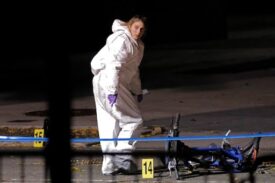
LOWER MANHATTAN — Sayfullo Saipov, convicted of killing eight people by driving a truck on a New York City bike path in 2017, will serve a life sentence in prison after a federal jury in Manhattan failed to reach a unanimous verdict on March 13 to give him the death penalty.
The jury was deliberating on nine capital counts in the penalty phase of Saipov’s trial.
In January, this same jury convicted Saipov of 28 charges, including murder in aid of racketeering and supporting a terrorist organization.
Judge Vernon Broderick read the jury’s verdict and accepted their decision. He did not immediately impose a life sentence, the default punishment, but said an official sentencing date will be scheduled.
Saipov, a 35-year-old native of Uzbekistan who lived in New Jersey, is expected to serve his life sentence, primarily in solitary confinement, at a maximum-security prison in Florence, Colorado.

His Halloween day attack on a popular bike path along the Hudson River also injured 11 people. Six of the eight fatal victims were tourists — five were from Argentina and one was from Belgium. A 23-year-old from Manhattan and a 32-year-old from New Jersey were the other victims killed during his rampage.
During his trial, prosecutors said Saipov tried to kill as many people as possible and planned to drive to the Brooklyn Bridge but was stopped by crashing into a school bus.
After crashing, he jumped out of the rented truck and ran down the highway shouting “God is great” in Arabic before being shot in the abdomen by a police officer.
In closing arguments at the penalty phase of his trial in March, Assistant U.S. Attorney Amanda Houle said Saipov deserved the death penalty for his “unremorseful slaughter of innocent civilians,” while defense attorney David Patton said that by sentencing his client to life in prison he would “die in prison in obscurity, not as a martyr, not as a hero to anyone.”
The case was the first federal conviction during the Biden administration that could have resulted in the death penalty.
Biden pledged during his campaign to work toward abolishing the federal death penalty, and no federal executions have taken place since he took office. U.S. Attorney General Merrick Garland imposed a moratorium on executions for federal crimes in 2021, but he has allowed U.S. prosecutors to continue advocating for the death penalty in cases inherited from previous administrations.
After the moratorium was announced, Catholic activists said it was a step in the right direction but not enough.
“While a moratorium on federal executions has symbolic value, we’ve seen the danger of half-measures that do not fully address the fundamental brokenness of our death penalty system. More is required,” tweeted Sister Helen Prejean, a Sister of St. Joseph and longtime death penalty opponent.
Similarly, Krisanne Vaillancourt Murphy, executive director of Catholic Mobilizing Network, the national Catholic organization working to end the death penalty, tweeted at the time that the Justice Department’s decision was a positive step, but more needed to be done to dismantle the “immoral, arbitrary and beyond repair” use of the death penalty.
